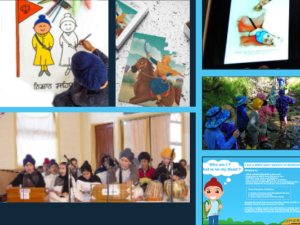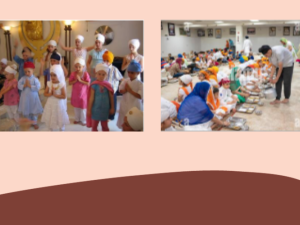Elisabeth Meru, born in Hamburg, is a poetess by heart, a storyteller by nature, a forwarding merchant/financial accountant by training, and a Sikh by choice. She is currently settled in Munich, Germany. During the past three decades, she has authored numerous short stories, articles and poetic compositions for various newspapers, journals and radio broadcasts. With over a dozen books, both in English and German languages, to her credit to date, she is a prolific author who specializes in writing on Sikh history, tradition, and culture.
Her 24-year-long spiritual quest brought her to the Gurdwara in Munich, wherein she heard Gurbani Kirtan for the first time. Therein she felt as if she had reached home. After continuous devotion and dedication to Sikhi for about seven years, she converted to Sikhism. Due to her love for Sikhi, Punjabi and Punjabiat, she learnt Gurmukhi.
Her first book in German, “Aus dem Herzen des Sikhismus - Guru Nanak Dev Ji - In deinem stillen Rosengarten” was published in 2009.The English version of the book "From the Heart of Sikhism - Guru Nanak Dev Ji - In your quiet rose garden" was published in 2010. These books describe the legends about the ten Gurus, their wisdom and teachings, and her poems, fables and a fairytale in German style. Elisabeth’s second set of books “Sikhism - Wellspring of Love” (in English) and “Sikhismus - Quell der Liebe” (in German), were published in 2010.
This book contains her poems and stories about Sikhism. The stories are rooted in the spirit of fairy tales. Her next book, in German, “Sikhs und Sikhismus: Religion, Riten und der Goldene Tempel” was published in 2011. In Feb. 2012, she with her team published the German edition of “Guru Granth Sahib Ji Essenz und Sikh Terminologie von A - Z.” It is a must-book for German-speaking Sikhs and all those who want a quick overview of basic terms in Sikhism. Another of her book, in German, “Sikhs ... der Bart ist ab,” was published in 2017.
Elizabeth's other excellent work, “Sikh Martyrs: The Scent of the Wild Rose,” was published in English in 2019. It includes the life stories of 42 Sikh Martyrs, belonging to the most painful part of the Sikh Sangat, starting with Guru Arjan Dev Ji. Talking about the Sikhs’ struggle for freedom from tyranny, she opines that:
“Whoever opens the gate to Sikh history and walks down the alley leading into the past of the Sikh community will meet a spectre of the tyrants. Freedom is one of the many reasons VAHEGURU JI sent the Sikh Gurus into the world. But as securing freedom demands courage, fortitude and struggle, numerous brave men have fallen in its name: inconspicuous warriors and grand warriors, heroes all of them”.
She published a novel: “The Sikh and the Evening Breeze - A Facebook Love,” in 2021, which uncovers the dichotomies in Sikh values and practices. On her continuous journey of love for Sikhi, she published her latest book, “Great Sikh Women - Part 1 - The Power of Love,” in 2022. It is a prelude to the trilogy on outstanding women in Sikhism. Narrating about all the Sikh women who belong to the family circle of the Sikh Gurūs, the author has basically kept to the existing textual guidelines. Her another book in German “Große Sikh-Frauen – Der zerschnittene Glück,” (Great Sikh Women – The Scar of Fortune) is ready for release. Whereas her other two books, “Great Sikh Women - Part 2” and “Great Sikh Women - Part 3,” are likely to come out during 2023. In addition, one dozen of her articles on various aspects of Sikhi has been published on Sikhnet.com since 2012.
I had the chance to read five of her books on Sikhism. Keeping in view her continuous commitment to the cause of the promotion of Sikhism and to understand her love of Sikhi, I took the opportunity to interview her on various aspects of her writings and literary interests. The following interview is the outcome of this interaction.
Dr. Singh: Can you share your life journey and coming of age in your search for spiritual attainments?
E. Meru: No. It is my way alone.
Dr. Singh: You are a freelance journalist with wide experience in diverse fields of human life. How have you become interested in Sikh theology?
E. Meru: I am not a journalist. I have searched for my GOD for twenty-four years and found HIM in Sikhism.
Dr. Singh: What are the key aspects of Sikhism that influenced you to adapt to the Sikh way of life?
E. Meru: Nothing has influenced me. HE has drawn me into HIS spell.
Dr. Singh: As per the Sikh doctrines, what is the meaning or purpose of our presence in this Universe?
E. Meru: Perhaps, that religion can do without a claim of absolutism. Live and let live.
Dr. Singh: How do you describe your worldview?
E. Meru: I can't define that.
Dr. Singh: Can you share any of your unique religious/spiritual experiences?
E. Meru: Given the case I had religious/spiritual experiences and told about them, other's eyes would not see what mine saw. Inappropriate discussions could result and destroy the sanctity of what was intended. Would it not then have been better to have remained on the royal path of silence?
Dr. Singh: What are some amazing revelations which you have come across from Sri Guru Granth Sahib?
E. Meru: If I claimed to have received some amazing revelations from Guru Granth Sahib Ji Maharaj, I would place myself in the ranks of great seers, which could be charged to me as sacrilege.
Notabene: Make everyone their own thoughts: The answers for the earlier two questions are the only ones which the wind has carried to me, once again, in GOD's quiet garden.
Dr. Singh: Do Sikh doctrines drive toward the sustainability of living beings on the earth?
E. Meru: As a German convertite, I must not claim for myself to be able to answer elementary spiritual questions of Sikh doctrines.
Dr. Singh: What are the barriers to promoting the Sikh worldview and Sikh values in Germany? Any possible solutions?
E. Meru: For the Sangat in Germany, I am persona non grata. I should probably not take a position on that.
Dr. Singh: You follow a storytelling style in most of your religious and historical narratives. Why do you think it is an appropriate medium to write on Sikh history?
E. Meru: Having always followed my inner voice, this precludes my thinking that it is a suitable medium.
Dr. Singh: You also experimented with writing on religious topics in a fairytale style. Are you satisfied with your outcome? If yes, please elaborate, and if no, then why?
E. Meru: I have never experimented but have always gone into GOD’s garden, in whose silence the wind whispered the stories to me. Since it is like it is, there is nothing to explain.
Dr. Singh: While writing about Sikh history, in your book titled: “Sikh Martyrs -The Scent of Wild Rose,” you have chosen a specific period which was full of struggles and turmoils for Sikhs. Any specific reason for doing so?
E. Meru: I cannot answer on behalf of my intuition.
Dr. Singh: What was the motive to produce a mix of Christian and Sikh imagery, as depicted in your book: “Sikh Martyrs -The Scent of Wild Rose”?
E. Meru: Here, too, I followed the muse that let me combine pain with beauty.
Dr. Singh: While writing on Sikh historical events, what sources do you depend upon for the authenticity and accuracy of your narration?
E. Meru: Each story has been reviewed by a German scholar of Sikhism (an absolute exception in Germany), who is fluent in Punjabi/Gurmukhi, and by a Sikh scholar who has researched original texts where appropriate.
Dr. Singh: Your book “Great Sikh Women- The Power of Love” highlights the often-neglected part of the Sikh heritage. It is an appreciable contribution to Sikh literature. What is the main message that you wanted to convey through this work? 1
E. Meru: I do not claim to want to convey a main message; I refer here also to the guidance of my inner voice.
Dr. Singh: In your other two beautifully illustrated books: “From the Heart of Sikhism Guru Nanak Dev Ji - In Your Quiet Rose Garden” and “Sikhism – Wellspring of Love,” you have experimented with a mix of various writing styles, e.g., fairy tale, fable, short story, and poetry. (a) Why? (b) I wonder if it puts your books in a category suitable for high school students. What is your opinion about it?
E. Meru: How can I answer what I do not understand myself? b) is intellectually conditioned.
Dr. Singh: What barriers are to translating Sikh scriptures and historical sources into German? How can the Sikh community overcome these hurdles?
E. Meru: As persona non grata, as mentioned earlier, I will not elevate myself to be the mouthpiece of the German Sikh community.
Dr. Singh: Karl Marx, the German philosopher, once said that "Religion is the opium of the people." Is Sikhism a new variety of this opium? Do you agree or disagree with it, and why?
E. Meru: Since the question refers purely to Is Sikhism a new variety of this opium?: defamatory, just defamatory to put such a thing in the room.
Dr. Singh: All the main religious philosophies are many centuries old. Do we need these in the present era? Why should people care about these ancient and perhaps outdated philosophies?
E. Meru: Because people might realize that little has changed: Civilization has a very thin layer of ice.
Dr. Singh: Why do Sikh practices appear to be out of sync with the Sikh doctrines in contemporary times?
E. Meru: If I answered that, I would make myself judge of them all.
Dr. Singh: What is the recent project you have taken up for promoting Sikhi, and what are you currently working on?
E. Meru: Great Sikh Women – Part 2 – The Scar of Fortune.
Dr. Singh: At this stage of life, how do you appraise your experiences as articulated in your book “The Sikh and the Evening Breeze – A Facebook Love”
E. Meru: Firstly, I do not understand your question. Secondly, everything has been said.
Dr. Singh: Any other aspect you wish to share that I might have missed asking?
E. Meru: No.
Dr. Singh: Thanks, Ms. Meru, for sparing your time to respond to my queries.








